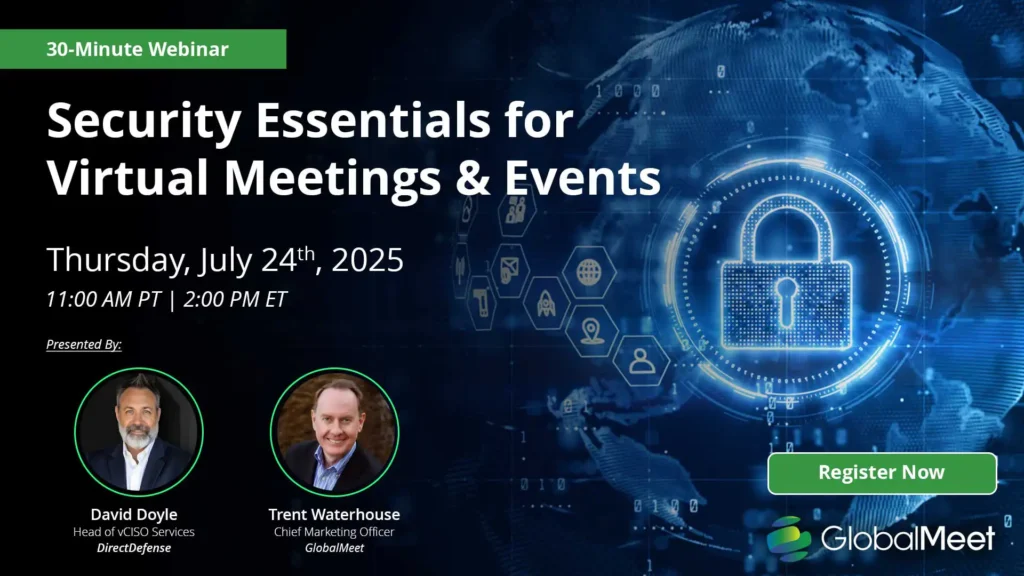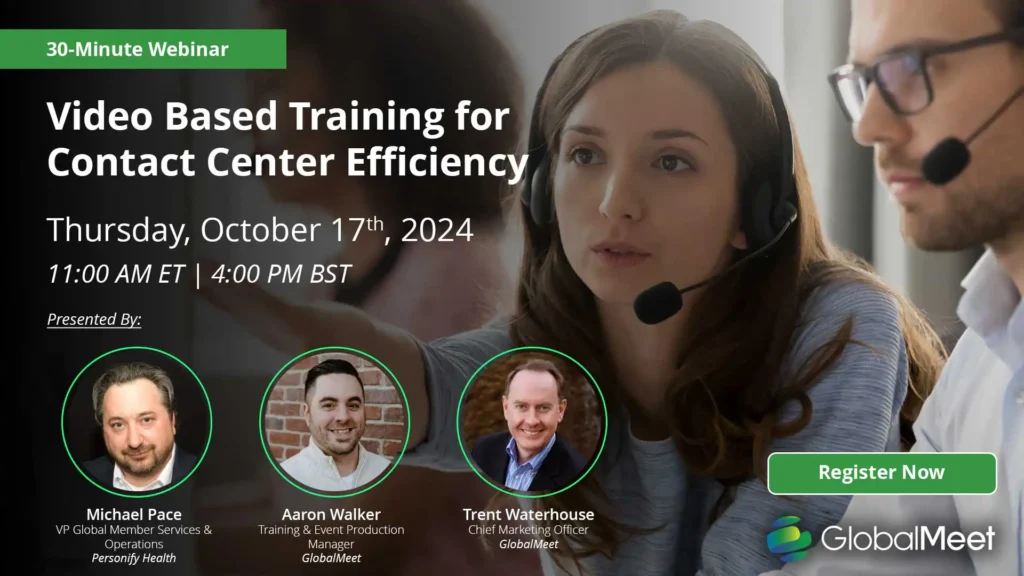
How Law Firms are Educating, Engaging, and Growing by Leveraging Hybrid Event Technology Platforms
- by GlobalMeet Blog Team
- ,
The legal industry is undergoing a significant transformation. With increasing digitalization and evolving client expectations, law firms must find new ways to engage their audience while maintaining the personalized communication that fosters trust. Hybrid events provide a powerful solution, blending the convenience of virtual participation with the impact of in-person interactions.
By leveraging hybrid event technology platforms, legal firms can enhance client communication, increase engagement, and expand their reach beyond traditional in-person boundaries. This blog explores the benefits, types, best practices, and challenges associated with hybrid events for law firms, offering insights into how they can use this innovative approach to stay competitive in the modern legal landscape.
Why Hybrid Events Work in the Legal Sector
Increased Accessibility and Reach
Hybrid events enable law firms to connect with clients, prospects, and industry professionals regardless of location. Virtual components allow attendees to join sessions from anywhere, eliminating travel barriers and accommodating busy schedules. This extended reach is particularly beneficial for firms looking to establish a national or global presence.
Cost Effective Client Engagement
Hosting traditional in-person events can be expensive, requiring venue rental, catering, and travel expenses. Hybrid events reduce costs by allowing firms to invest in high-quality digital experiences while maintaining the option of in-person attendance for key stakeholders.
Enhanced Client Communication and Relationship Building
Hybrid events provide multiple touchpoints for client engagement. Interactive features such as live Q&A sessions, virtual networking rooms, and on-demand content help maintain ongoing communication. Personalized follow-ups based on attendee interactions further strengthen client relationships.
Improved Learning and Knowledge Sharing
Law firms often need to educate clients about legal changes, compliance requirements, and industry trends. Hybrid events make it easier to disseminate information through recorded sessions, expert Q&A panels, and digital resources that attendees can revisit at their convenience.
Data-Driven Insights
Hybrid event platforms provide valuable analytics, tracking attendee behavior, engagement levels, and session popularity. This data enables firms to refine their approach, tailor future events, and personalize follow-up communications.
Client Engagement Benefits of Hybrid Events
Effective client engagement is crucial for law firms to maintain trust and establish authority. Hybrid events offer unique advantages in this area:
- Personalized Experiences: Attendees can choose how they participate, creating a more flexible and customized experience. By offering multiple participation options—such as attending a live session, viewing a recorded version, or engaging in smaller discussion groups—law firms cater to different learning styles and availability constraints.
- Real-Time Interaction: Live chat, polls, and Q&A sessions keep audiences actively engaged. Hosting interactive discussions and allowing participants to ask questions in real-time fosters a more inclusive and engaging atmosphere, making virtual attendees feel equally involved.
- Multi-Channel Communication: Hybrid formats allow firms to leverage email, social media, and virtual platforms for outreach and engagement. Automated email reminders, follow-up surveys, and social media discussions can enhance client touchpoints before, during, and after the event.
- Stronger Connections: In-person components facilitate meaningful face-to-face discussions, while virtual options provide ongoing accessibility. Virtual networking lounges, breakout rooms, and AI-driven matchmaking can help remote participants connect with relevant peers and professionals, ensuring a well-rounded experience for all attendees.
Types of Hybrid Events for Legal Firms
Client Seminars and Webinars
Hybrid seminars educate clients on legal matters, such as regulatory updates, compliance requirements, and contract law changes. Firms can invite local clients to attend in person while broadcasting sessions online for a broader audience.
Continuing Legal Education Programmes
Offering CLE programs in a hybrid format allows legal professionals to participate in essential training remotely while still providing an in-person option for networking and discussions.
Panel Discussions and Roundtables
Expert-led discussions on trending legal topics can attract industry leaders, clients, and prospects. A hybrid format ensures maximum participation while maintaining an interactive experience.
Networking Events
Hybrid networking events combine physical meet-ups with virtual breakout rooms, fostering connections between lawyers, clients, and industry professionals.
Client Onboarding and Training
For firms handling corporate clients, hybrid training sessions can streamline onboarding processes, ensuring key stakeholders understand legal requirements and best practices.
Firm Open Houses and Thought Leadership Conferences
Hosting open houses or thought leadership events in a hybrid format enhances brand visibility and allows law firms to showcase their expertise to a wider audience.
Best Practices for Hosting Successful Hybrid Legal Events
Choose the Right Technology Platform
Selecting a reliable hybrid event platform is crucial. Key features to look for include:
- High quality live streaming
- Interactive tools such as polls, chats, and Q&A facilitation
- Networking capabilities
- Analytics and reporting tools
- On-Demand content options
Prioritize Audience Engagement
Keeping both in-person and virtual attendees engaged requires careful planning. Encourage participation for online participants through live questions and interactive elements so that they feel as valued as the people in the room. Use moderators to bridge the gap between physical and virtual audiences, and offer breakout sessions for those attending online to foster deeper communication.
Ensure Seamless Communication
Clear communication before, during, and after the event is vital. Provide detailed instructions on how to join and participate. Follow up with attendees through personalized emails, additional resources, and event recordings.
Invest in Quality Production
A professional setup with good lighting, sound quality, and camera angles enhances the virtual experience. Investing in a dedicated production team ensures smooth execution.
Integrate Networking Opportunities
Facilitating meaning connections is key to a successful hybrid legal event. Offer virtual networking lounges for delegates to meet one another, enable one on one video chats for more in depth conversations, and crate post-event discussion groups on social media to keep the conversations going long after the event has closed.
Gather and Utilize Feedback
Post-event surveys and analytics help measure success and identify areas for improvement. Use feedback to refine future hybrid events and enhance client engagement strategies.
Overcoming Common Challenges in Hybrid Events
Balancing In-Person and Virtual Experiences
Ensuring both audiences feel equally valued can be challenging. Solutions include hiring a virtual moderator, using interactive tools, and keeping online attendees actively involved.
Managing Technical Issues
Technical glitches such as missing video or audio quality drops can disrupt the event experience. Conduct test runs, have backup plans in place, and always choose a provider who can provide real-time tech support and production assistance to keep your events running smoothly.
Encouraging Virtual Participation
Virtual attendees are at risk of decreased engagement and digital fatigue. To counteract this, it is important to provide activities that keep them engaged. Use gamification techniques such as quizzes and rewards to keep them in the room. Offer incentives for active participation, and always keep online sessions concise and dynamic.
Measuring ROI and Success
Defining clear KPIs, such as attendee engagement, client inquiries, and follow-up interactions, helps measure the event’s impact, allowing you to build on lessons learned and run better and stringer events in the future.
Conclusion
Hybrid events are transforming how law firms educate, engage, and grow their client base. By blending virtual accessibility with in-person relationship-building, legal professionals can enhance communication, foster stronger connections, and expand their reach. Leveraging the right technology, best practices, and engagement strategies ensures hybrid events become a valuable asset in a firm’s marketing and client engagement toolkit.
As the legal sector continues to evolve, embracing hybrid events will be key to staying competitive and meeting the demands of a digital-first world.





